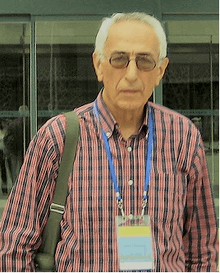Juansher Chkareuli
| Juansher (John) Chkareuli | |
|---|---|
 | |
| Born |
January 13, 1943 Tbilisi, Georgia, USSR |
| Alma mater | Tbilisi State University |
| Known for | Family symmetries, Extended Grand unified theories, Emergent gauge and gravity theories |
| Scientific career | |
| Fields | Theoretical Particle Physics |
| Institutions |
Institute of Theoretical Physics, Ilia State University & Andronikashvili Institute of Physics, Tbilisi State University |
| Doctoral advisors |
Sergei Matinyan Victor Ogievetsky |
| Doctoral students | Zurab Berezhiani, Giorgi Dvali, Ilia Gogoladze, Archil Kobakhidze, Zurab Tavartkiladze |
Juansher Levan Chkareuli (Georgian: ჯუანშერ ჩქარეული; born 1943, Tbilisi) is a Georgian theoretical physicist working in particle physics, Professor at Institute of Theoretical Physics of Ilia State University in Tbilisi and Head of Particle Physics Department at Andronikashvili Institute of Physics of Tbilisi State University.[1][2]
Academic career
Education : MSc (1965), Theoretical Physics, Tbilisi State University and Lebedev Physical Institute (Moscow); PhD (1970) and DSc (1985), Theoretical Particle Physics, Andronikashvili Institute of Physics (Tbilisi) and Joint Institute for Nuclear Research (Russia).
Appointments : Principal Research Fellow at Andronikashvili Institute of Physics (1985–present); Professor of Theoretical Physics at Tbilisi State University (1986-1990); Professor of Theoretical Physics at Ilia State University (2006–present).
Visiting Professor / Senior Research Scientist at the European Organization for Nuclear Research (CERN) in Geneva, University of Sussex, Royal Holloway University of London, University of Glasgow, Max-Planck Institute in Munich, International Centre for Theoretical Physics (ICTP) in Trieste, University of Maryland, University of Melbourne, Institute of High Energy Physics in Beijing; 1991-2012.
Research : J.L. Chkareuli is primarily known for Family symmetries, Extended grand unified theories and Emergent gauge and gravity theories. These developments include: An introduction of the chiral family symmetry SU(3) for quark-lepton generations[3] and its application to the flavor mixing of quarks and leptons;[4][5][6][7][8] A novel missing VEV mechanism in the supersymmetric SU(8) grand unified theory with a simultaneous solution to the gauge hierarchy problem and unification of flavor;[9][10] New nonlinear sigma models for emergent gauge and gravity theories leading to dynamical generation of local internal and spacetime symmetries with gauge fields and gravitons as massless vector/tensor Goldstone bosons.[11][12][13][14][15]
Conferences and symposia : J.L. Chkareuli was an organizer and co-organizer of some notable conferences and workshops on high energy physics - Annual Georgian Winter School on particle physics and cosmology (Bakuriani, Georgia, 1970-1993)[16] having been one of the most popular scientific meetings in the USSR; International seminar "Standard Model and Beyond" (Tbilisi, 1996); [17] International conference "Low dimensional physics and gauge principles" (Yerevan & Tbilisi, 2011).[18] He also was an invited speaker at many leading particle physics conferences including ICHEP (1994, 1998) in Glasgow and Vancouver, Quarks-2000 in Saint Petersburg, SUSY-2012 in Beijing and others.
Honours and awards
Royal Society Fellowship (1993–94); Royal Society Joint Project Grant (1999-2000), Georgia-US Bilateral Grant (2003-2005); Member of the American Physical Society (1993), Fellow of the Institute of Physics (UK, 2000), President of the Georgian Physical Society (1993–99). Listed in the biographical dictionaries including «Who is Who in Science and Engineering» (2008), Marquis Who's Who, NY; «2000 Outstanding Scientists 2008/2009» (2010) and «Great Men and Women of Science» (2017), International Biographical Centre, Cambridge.
References
- ↑ http://www.worldcat.org/title/juansher-john-levan-chkareuli/oclc/4780133409&referer=brief_results#reviews.
- ↑ https://www.researchgate.net/profile/JL_Chkareuli.
- ↑ Chkareuli, J. L. (December 1980). "Quark-lepton families: from SU(5) to SU(8) symmetry" (PDF). Soviet Journal of Experimental and Theoretical Physics Letters. 32: 671–674. Bibcode:1980JETPL..32..671C. ISSN 0021-3640. DESY-L-TRANS-253.
- ↑ Berezhiani, Z.G.; Chkareuli, J.L. (April 1983). "Quark-Lepton Families in a Model with SU(5)⊗SU(3) Symmetry". Sov. J. Nucl. Phys. 37 (4): 618.
- ↑ Berezhiani, Z.G. (September 1983). "The weak mixing angles in gauge models with horizontal symmetry — A new approach to quark and lepton masses". Physics Letters B. 129 (1–2): 99–102. Bibcode:1983PhLB..129...99B. doi:10.1016/0370-2693(83)90737-2.
- ↑ Khlopov, Maxim Yu (1999). Cosmoparticle Physics. Singapore: World Scientific. p. 577. ISBN 9810231881.
- ↑ King, S.F.; Ross, G.G. (November 2001). "Fermion masses and mixing angles from SU(3) family symmetry". Physics Letters B. 520 (3–4): 243–253. arXiv:hep-ph/0108112. Bibcode:2001PhLB..520..243K. doi:10.1016/S0370-2693(01)01139-X.

- ↑ Appelquist, Thomas; Bai, Yang; Piai, Maurizio (August 2005). "Breaking discrete symmetries in broken gauge theories". Physical Review D. 72 (3): 036005. arXiv:hep-ph/0506137. Bibcode:2005PhRvD..72c6005A. doi:10.1103/PhysRevD.72.036005.
- ↑ Chkareuli, J.L.; Gogoladze, I.G.; Kobakhidze, A.B. (February 1998). "SU(N) supersymmetric grand unified theories: Natural projection to low-energies". Physical Review Letters. 80 (5): 912–915. Bibcode:1998PhRvL..80..912C. doi:10.1103/PhysRevLett.80.912.
- ↑ J.L. Chkareuli, "SU(N) SUSY GUTS with string remnants: minimal SU(5) and beyond", Invited talk given at the 29th International Conference on High Energy Physics (ICHEP '98), Vancouver, 23–29 July 1998; Proceedings of ICHEP '98, Singapore: World Scientific, 1999, p. 1669-1673, arXiv:hep-ph/9809464, doi:10.1142/9789812818096, ISBN 9810237723 .
- ↑ Chkareuli, J.L.; Froggatt, C.D.; Nielsen, H.B. (August 2001). "Lorentz invariance and origin of symmetries". Physical Review Letters. 87 (6): 091601. arXiv:hep-ph/0106036. Bibcode:2001PhRvL..87i1601C. doi:10.1103/PhysRevLett.87.091601.
- ↑ Visser, Matt (July 2009). "Lorentz symmetry as a quantum field theory regulator". Physical Review D. 80 (3–4): 025011. arXiv:0902.0590. Bibcode:2009PhRvD..80b5011V. doi:10.1103/PhysRevD.80.025011.
- ↑ Sindoni, Lorenzo (May 2012). "Emergent models for gravity: An overview of microscopic models". SIGMA. 8 (1): 027. arXiv:1110.0686. Bibcode:2012SIGMA...8..027S. doi:10.3842/SIGMA.2012.027.
- ↑ Sundermeyer, Kurt (2014). Symmetries in fundamental physics. Cham, Switzerland: Springer. p. 763. doi:10.1007/978-94-007-7642-5. ISBN 9789400776418.
- ↑ Chkareuli, J.L. (April 2017). "On the origin of Poincare gauge gravity" (PDF). Physics Letters B. 769 (3–4): 377–384. Bibcode:2017PhLB..769..377C. doi:10.1016/j.physletb.2017.04.012.
- ↑ http://inspirehep.net/record/968216?ln=en.
- ↑ http://inspirehep.net/record/970866?ln=en.
- ↑ http://inspirehep.net/record/1220831, http://crd.yerphi.am/Conferences/lowdim2011/home.